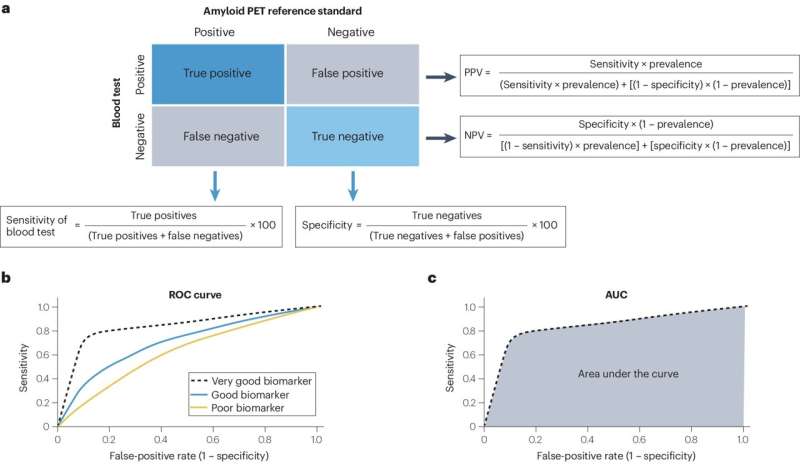
Neurologists diagnose cognitive impairment with a scientific examination of reminiscence and considering expertise. To find out whether or not Alzheimer’s illness is the reason for the cognitive impairment, proof of the precise mind adjustments that characterize Alzheimer’s should be obtained, sometimes by way of a mind scan or spinal faucet. Figuring out individuals whose cognitive signs are attributable to Alzheimer’s illness is essential now that new Alzheimer’s therapies can be found that would change the course of the sickness.
To make analysis extra handy for sufferers, many corporations have begun promoting Alzheimer’s blood assessments to customers, and no less than 5 corporations are actually providing these assessments to medical doctors for scientific use. Medical doctors haven’t any method of figuring out which assessments are most correct, as a result of till now, the assessments haven’t been evaluated in a head-to-head comparability utilizing the identical inhabitants, strategies and standards.
Suzanne Schindler, MD, Ph.D., and her workforce at Washington College College of Medication in St. Louis led an information evaluation evaluating the accuracy of six industrial blood assessments, 4 of that are clinically accessible, in detecting indicators of Alzheimer’s illness, notably the presence of the attribute amyloid plaques within the mind. The evaluation confirmed that a few of the assessments are correct sufficient to interchange spinal faucets and mind scans in lots of sufferers with cognitive impairment. The outcomes are being introduced in the present day, July 30, in an oral session on the Alzheimer’s Affiliation Worldwide Convention in Philadelphia.
“Among the blood assessments are correct and a few should not, and medical doctors do not know which assessments to make use of,” mentioned Schindler, an affiliate professor of neurology at Washington College and the lead writer of the examine. “With this head-to-head comparability, medical doctors now have extra dependable details about which assessments will greatest assist them present an correct analysis to their sufferers.”
Confirming that cognitive impairment is because of Alzheimer’s illness—early in the middle of the sickness—is essential for making certain entry to the latest era of Alzheimer’s therapies. Previously two years, the Meals and Drug Administration (FDA) has permitted two medicine that sluggish the trajectory of illness, with extra within the pipeline. Each FDA-approved medicine goal amyloid, so medical doctors should verify {that a} affected person has amyloid buildup within the mind earlier than they will prescribe the therapy. As well as, the analysis should be confirmed as early within the illness course as potential, as a result of the medicine are solely permitted for individuals with very gentle to gentle signs.
The workforce evaluated the flexibility of six commercially accessible blood assessments to detect proteins within the blood that correlated with key options of Alzheimer’s illness: amyloid plaques and tangles of the protein tau within the mind, diminished mind volumes and cognitive impairment. The six assessments have been developed by ALZpath, C2N Diagnostics, Fujirebio Diagnostics, Janssen, Quanterix and Roche Diagnostics. C2N Diagnostics is a Washington College startup, and its Alzheimer’s assessments are based mostly on expertise licensed to C2N by the college.
Blood samples and participant knowledge have been obtained from the Alzheimer’s Illness Neuroimaging Initiative (ADNI), a long-running, multisite collaboration designed to establish Alzheimer’s biomarkers and to advance biomarker improvement by sharing knowledge and assets inside the analysis neighborhood. The examine included 392 individuals who had offered blood samples inside six months of present process mind scans. The individuals had a median age of 78.1 years, and slightly below half (49%) exhibited cognitive impairment.
Every of the six assessments measured the blood ranges of a number of biomarkers linked to Alzheimer’s illness. Throughout the six assessments, 5 distinct biomarkers have been measured utilizing numerous methods. One biomarker, utilized in 4 of the assessments, proved exceptionally correct at figuring out indicators of Alzheimer’s illness: a type of tau generally known as phosphorylated tau 217 (p-tau217).
“Some individuals thought that we would must measure a number of biomarkers to get on the completely different options of Alzheimer’s illness,” mentioned Kellen Petersen, Ph.D., an teacher in neurology on the College of Medication. Petersen co-led knowledge evaluation for the examine and can give the oral presentation on the worldwide Alzheimer’s convention. “That is not what we discovered. P-tau217 alone can do all of it. It precisely predicted ranges of amyloid and tau within the mind, mind volumes and cognitive signs. It was extra correct than every other biomarker, and even any mixture of biomarkers, throughout the board.”
The 4 assessments that incorporate measures of p-tau217 all carried out nicely, whatever the method they took to measuring the protein. The highest two performers throughout all measures have been C2N Diagnostics’ PrecivityAD2 and Fujirebio’s Lumipulse.
In June, the World CEO Initiative on Alzheimer’s Illness printed a paper in Nature Critiques Neurology laying out a framework for utilizing blood assessments in Alzheimer’s scientific care and recommending minimal standards for acceptable efficiency. Schindler is the lead writer on that paper.
“We concluded that for use with out a second check, blood assessments have to be as correct as FDA-approved cerebrospinal fluid assessments, that are roughly 90% delicate and particular at figuring out Alzheimer’s illness in cognitive impaired people,” Schindler mentioned. “On this present examine, the p-tau217 assessments met that normal, however the others didn’t.”
Extra data:
Suzanne E. Schindler et al, Acceptable efficiency of blood biomarker assessments of amyloid pathology — suggestions from the World CEO Initiative on Alzheimer’s Illness, Nature Critiques Neurology (2024). DOI: 10.1038/s41582-024-00977-5
Quotation:
Accuracy of diagnostic blood assessments for Alzheimer’s illness varies (2024, July 30)
retrieved 31 July 2024
from https://medicalxpress.com/information/2024-07-accuracy-diagnostic-blood-alzheimer-disease.html
This doc is topic to copyright. Aside from any honest dealing for the aim of personal examine or analysis, no
half could also be reproduced with out the written permission. The content material is offered for data functions solely.

